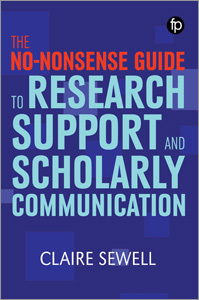Primary tabs
You don't need to be an ALA Member to purchase from the ALA Store, but you'll be asked to create an online account/profile during checkout to proceed. This Web Account is for both Members and non-Members. Note that your ALA Member discount will be applied at the final step of the checkout process.
If you are Tax-Exempt, please verify that your account is currently set up as exempt before placing your order, as our new fulfillment center will need current documentation. Learn how to verify here.
- Description
- Table of Contents
- About the author
- Reviews
Academic libraries have seen huge changes in recent years thanks to the increasing availability of information online but they are now undergoing another shift. As libraries move away from providing access to existing information and towards helping users create new knowledge there is an opportunity for them to develop new services for the research community. To do this successfully libraries need to have a knowledgeable workforce who are equipped to provide the support that researchers need. Information professionals are increasingly being asked to advise their users on issues such as open access and research data management but are often doing so with little or no formal preparation. Outlining the reasons why library staff need to develop a knowledge of research support and guiding them through the key information on each topic, The No-nonsense Guide to Research Support and Scholarly Communication provides an ideal primer for those who seek to work in this area or those who have acquired these responsibilities as part of a wider role. The practical nature of the book means readers can dip into it or read it from cover to cover as needed. It includes practical checklists of knowledge and skills, international case studies by practitioners from around the globe, end of chapter references, how-to sections, activities and links to freely available online training materials. The book covers
- scholarly communication, open research and the research lifecycle;
- research data management;
- open access;
- disseminating research;
- metrics and measuring impact including the Journal Impact Factor, H-Index, and Altmetrics;
- career paths in research support; and
- why and how library staff at all levels can get involved in the process of doing research and sharing their outputs.
1. Introduction
2. Scholarly communication 101
3. Research data management
4. Open access
5. Disseminating research
6. Metrics and measuring impact
7. Career paths in research support
8. Getting involved in the scholarly communication process
9. Conclusion
Claire Sewell
Claire Sewell is Research Support Skills Coordinator in the Office of Scholarly Communication at Cambridge University Library. She is a qualified CILIP Chartered librarian, Conference Coordinator for the SLA Europe Board and Associate Editor of the New Review of Academic Librarianship. She regularly contributes to the professional press including book reviews, commissioned case studies and opinion pieces and peer reviewed scholarly articles.
"The structure, which covers the research process from data management through publication and impact assessments, is well suited for cover-to-cover reading ... Well organized and clearly written."
— CHOICE
"Libraries with burgeoning scholarly communication programs will find this book to be a valuable resource for understanding the basic concepts of research support and introducing readers to the changing world of scholarly communication. Universities, research offices, and scholarly communication departments will benefit from the practical illustrations of how staff in both research and non-research roles can contribute to the scholarly communication process."
— Serials Review



